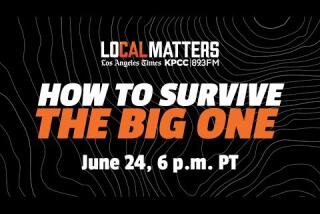To Prevent Disaster, Prepare for One
- Share via
Clarisa F. Howard had a management and accounting background when she left the confines of a corporate aerospace job to start her own company providing engineering and information technology services for government and private industry. Her company, which got assistance from the Small Business Administration’s 8(a) business development program, is being honored with the Entrepreneurial Success Award. Howard credits much of her success to her determination to hope for the best but prepare for the worst. She was interviewed by freelance writer Karen E. Klein.
We develop software systems and manage and automate data for clients like the [Air Force’s] Space and Missile Systems Center, Hughes Aircraft and Boeing. The contracts we bid on are very large, and disruptions and problems can happen. I’ve found that planning and preparation are key when it comes to lessening the impact of the negative.
For instance, when we first started we had a relationship with a very important client. When it came time for him to cut costs, we were the first subcontractor to go. We had been so excited to have that contract, and so focused on doing a good job with it that we hadn’t even thought about diversifying and finding other customers.
That situation taught us to keep marketing continually, plan six months to two years out, and always have a contingency plan. Recently, we were about 90% sure we would get a follow-on contract involving a significant amount of revenue. Even though we were the incumbent and it looked good that we would receive the contract, we got the top three officers of the company together and wrote a plan that covered the what-ifs: What other projects could we move employees into quickly? What would the impact be of the lost revenue? Where could we cut costs to make up for that impact?
We were blessed to get the contract and we did not have to put the contingency plan into effect. But if we hadn’t gotten it, we would have handled things smoothly without risking losing our business.
We feel the same way about disaster preparedness. We have our computer files backed up weekly and stored at various off-site locations, and we rotate them periodically so we can minimize the problems that we would face in case of a power outage, earthquake or other disaster.
I even take the preparedness mind-set into our banking relationships. We had a banker in Torrance we worked with initially, but in our third year of business they changed their focus away from small businesses and they wouldn’t renew our line of credit. We had to regroup on our banking situation and start over with a new bank.
Now, I interview bankers before I open an account. I look at all their services and I ask them to come over and visit our company, get to know something about our business, meet our managers. I also make a point of having accounts open at several different banks, so if there is a need to activate a relationship with another bank, you’ve already established an experience base.
You never know when one bank will be bought out by another bank and their focus or employees will change. Or you may grow larger and the line of credit your current bank provides will not be adequate.
In any aspect of business, if you do the advance planning it will always save you dollars, revenue and peace of mind.
(BEGIN TEXT OF INFOBOX / INFOGRAPHIC)
At A Glance
* Company: Bd Systems Inc.
* Owner: Clarisa F. Howard
* Nature of business: Aerospace systems engineering and information technology
* Location: 385 Van Ness Ave., Suite 200, Torrance
* Web site: https://www.bdsys.com
* Year founded: 1981
* Employees: 360
* Annual revenue: $35 million
More to Read
Inside the business of entertainment
The Wide Shot brings you news, analysis and insights on everything from streaming wars to production — and what it all means for the future.
You may occasionally receive promotional content from the Los Angeles Times.










